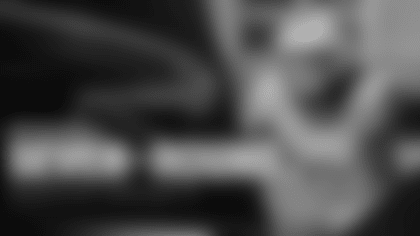Elisha Jarrett looked on as her son's heart was breaking.
He had just emerged from the blue medical tent on the sideline at Nissan Stadium in Nashville, Tennessee. The Falcons' Week 8 game against the Tennessee Titans had just begun, the first defensive series just wrapped. What could be wrong? He played the whole series without issue.
However, when mother and son locked eyes – mother in the stands, son on the sideline – realization took hold.
"I knew," Elisha said. "When I saw his face when he came out (of the tent), I knew that it was not good."
Despite the pain he was in physically, Grady Jarrett walked with his head held high to the visiting team locker room as the Falcons' offense took to the field.
After a few quick tests with team doctors in the normally rowdy locker room now void of noise, Jarrett could tell something was seriously wrong. By their demeanor, he knew there was a road ahead that he didn't ever want to walk down, one he never had before.
His knee, which on the second play of the game knocked weirdly against an offensive lineman, didn't feel right.
As doctor's explained the situation to Jarrett, Elisha was escorted to the locker room. Once there, the emotion of the moment and what it meant for the future hung heavy in the room. All Elisha could do was look on as her son processed the reality of this injury being season ending.
"It's probably one of the most devastating moments that I've ever seen him through," Elisha said. "It was so hard.
"And, of course, both of us can't cry at the same time. So, I was trying to hold him up."
But, even Elisha's resolve broke.
"I walked out of that locker room and just lost it," she recalled. "I had to stand outside the door for a minute."
Looking back on that moment, Jarrett said the only feeling that compared was that of a broken heart.
For so long, Jarrett had been a symbol of consistency, strength and success. Through nine years in the league, he'd only ever missed three games.
In an almost divine form of symmetry, Jarrett would miss nine games with a torn ACL in his ninth professional year.
Now, nine months removed from that day in Nashville, Jarrett reflects on what it took – the pain, the conviction – to get back for Year 10.
"You do everything you can to avoid situations like this, but it does show you that at the end of the day, we are all mortal," Jarrett said. "… You could think you're the hardest worker, but trials and tribulations? They're going to come, and it's all about how you respond."

Fighting through the fog of painkillers and anesthesia, Grady Jarrett slowly blinked his eyes open. Laying in a hospital bed in Vail, Colorado, the fog cleared with each passing second of consciousness, and Jarrett found himself consumed with one thought.
"It's go-time now," he said.
Nurses checked Jarrett's post-operation vital signs as Elisha Jarrett made her way to her son's recovery room. Power-walking her way into the space, Elisha didn't mince words.
"Alright bud," Elisha remembers saying, "it's time to go to work."
Jarrett's response? "I already know"
"And literally, that afternoon," she said, "he was up walking."
With ACL injuries and recovery, the first two weeks post-op are the most critical. So, the Jarrett family made plans to stay in Colorado for the entirety of those first two weeks, even longer if they needed to.
For Jarrett, he was ready to throw himself headfirst into the rehab process. Something about any recovery process, though? Sometimes the head and heart say one thing but the body has different plans.
"The first two weeks were some of the most painful things I've had to deal with, especially once the pain blocks wore off," Jarrett said. "I remember getting up for my second day of (physical therapy) and I was just stunned. I was trying to get off the couch, but my body, my knee, was in so much pain.
"I hadn't felt that, the stun or the heaviness. I don't think I have ever felt like that. And I was just like, 'Wow, this is for real.'"
And so began step one of the recovery process: Mastering the simple movements that one often takes for granted.

Jarrett said he needed help to do just about everything during those first two weeks. Whether it was getting in and out of the car, walking around the house, going up stairs, it was all difficult. And oh, how he hated that.
"I take a lot of pride in being a protector, whether it is with my family or being a general (out on the field), being head forward going against other teams," Jarrett said. "I don't back down from nothing. But then I was in a place where (I) needed a lot of help and assistance.
"... I've squatted hundreds and hundreds of pounds over my lifetime, but to get my leg up like that?" he said, straightening his knee up a couple inches. "It took everything in me."
Looking back, this early obstacle was the one that stung the most, mentally as much as physically. It's the realization that your body can't do what it's always done. It's the fact that – physically – you are laid low. For Jarrett, it was important he kept this battle private.
"It would have been super hard for me to be around the facility and see my guys," Jarrett said. "For me, it's different. These are like my little brothers. … More often than not these guys are at least two or three years behind me, and they look up to me and I take pride in that."
Jarrett still kept up as much as he could, though.
From afar he watched games and film from his phone during physical therapy sessions. That was hard, too, he said. But it was very important to Jarrett that he didn't fall victim to the feelings that could have been all-consuming.
"I knew it was going to be a tough mental battle for me, but I didn't want to allow the space for me to fall into a state of – whether you call it – depression or woe-is-me, especially from the time I had it confirmed, I knew I was going to have to fight this physically, mentally," he said.
That doesn't mean there weren't bad days for Jarrett. That doesn't mean he didn't feel sad, upset or depressed. It just meant that as much as he felt those emotions, "you got to be willing to fight out of them, too."
"I've worked too hard to get to this moment where I am to let this define anything about my career," Jarrett said. "If anything, it's going to define me in a positive way: How you come back, how you overcome."
So, he reframed his mind. There would be no woe-is-me mentality. There would only be wins.
Jarrett's mindset during the early days of recovery became simple: For every small movement, he'd mark it in his head as a victory, just like he would games played on the field.
"Whether it's going from being wheeled around in a wheelchair, to getting in and out of cars, getting to the point of getting my leg picked up without assistance … little checkpoints become little wins," he said.
"This may be small for somebody else, but it's a win for me today."
And with every small win, he worked harder. Worked so hard, Elisha said, that the doctors had to tell him to slow down from time to time.
"They said, 'You are way ahead of schedule. Calm down. Slow down. We don't need to re-injure anything,'" she said before a laugh. "But he wasn't trying to hear it, and that has been consistent from the time of the injury until today."

Grady Jarrett isn't the first person to suffer a season-ending injury, and he won't be the last. To make his story of injury and recovery a one-of-one isn't genuine. Others – many others – have gone through this and much worse.
And this is the mindset Jarrett continues to hold now, looking towards a return to the football field for his 10th professional year. He's not trying to be different from those who have come before him or those who will surely come after him. He's seeking to relate to them, teach them, give them an example of which to follow.
"Whether you're rec league, high school, college, pro, that heartbreak is unmatched," Jarrett said. "And I never would have understood that had I not gone through this."
This injury put a lot of things into perspective, as most time-stopping moments do. And for Jarrett, his livelihood and his passion had to stop for a time with this injury.
"Something I learned about myself was just really how much I do love the game," he explained. "When I am willing and able and my body is ready to go? There ain't nothing in the world that I'd rather do other than playing football."
God, how he missed it, he said. He missed all of it: The feel of the grass beneath his cleats, the musty atmosphere of a locker room after a hard day of practice, the fire in his own eyes on a must-have, third-down stop in a game.

How much he truly missed the game gave Jarrett an insatiable hunger that intensified as his workouts did.
When Jarrett got back to the Falcons' facility for the start of the offseason training programs in April, new head coach Raheem Morris said he immediately noticed a look in Jarrett's eye that demanded attention because of the power behind it.
"An angry Grady? A motivated Grady? A Grady who's going to play for the love of the game all over again and reset this thing?" Morris said. "That's what you want, what you need."
The injury in Year 9 didn't change Jarrett's mindset for Year 10. It didn't add to his fire. Asked point blank if it did and without hesitation Jarrett said, "No."
That's because Jarrett operates at a maximum level anyways. There's no more fire to add to something already ablaze.
If anything, he said, this only presents a new chapter in the story he's trying to write for himself.
"If you're chasing a legacy like I am," he said, "this is just part of the story."
















